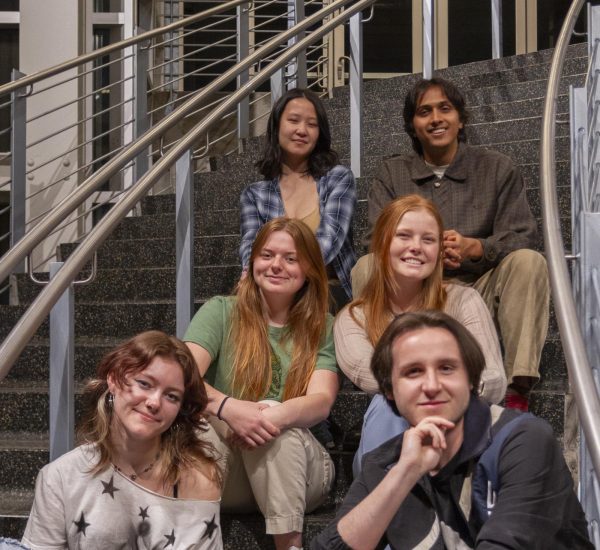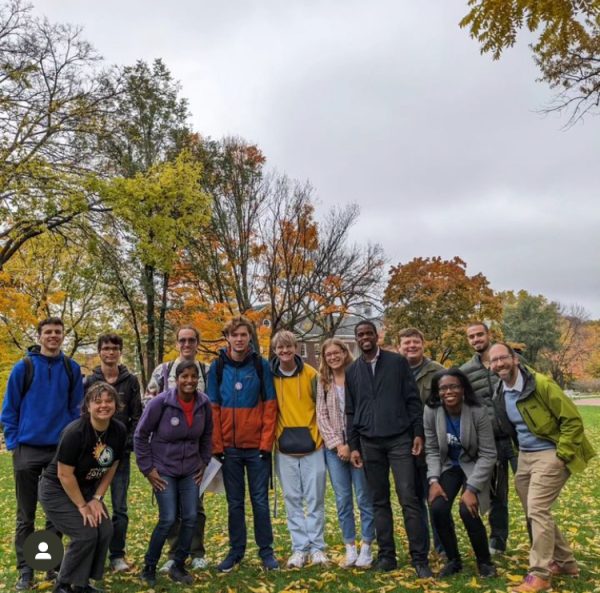By Kenyon Devault
Let’s get this out of the way right now. Up until this past Tuesday, I had not seen Brokeback Mountain, an admission which has elicited reactions ranging from incredulity to outright scandal. Although my interest was piqued the moment I heard about a gay cowboy movie featuring two “hot young actors,” it swiftly became clear that this film would be no sex-filled romp-in-the-not-so-proverbial-hay but rather a Cultural Phenomenon, simultaneously indicating I would no longer be able to watch as a horny filmgoer but from the sometimes exhausting position of Media Critic. Now, almost three months after its initial release, and with the encouragement of The Mac Weekly Arts section, the fated meeting of Brokeback Mountain and Kenyon DeVault, Media Critic, arrived.
At this point, most people recognize that Brokeback has been universally acclaimed by the mainstream media. Metacritic.com, based on 41 outside reviews, gave the film an average score of 87/100; 17 of those reviewers, including Rolling Stone and The New York Times, gave the film a perfect rating. Obviously, its eight Oscar nominations, including Best Picture, Best Direction, and three of four acting awards, add exponentially to its cultural cache. What interests me, as it does many, is how a film that romanticizes a homosexual affair that ends one traditional heterosexual marriage and all but ruins another can achieve such success in a culture which determinedly opposes many seemingly, at least to this liberal queer, rudimentary rights to same-sex partners and non-straights.
It’s clear to me that homophobic beliefs amongst the American public were a central concern to the film’s distributors. In many articles I encountered, members of the production emphasized the film as simply a love story, not a specifically gay one geared towards a gay audience, and I agree. This film certainly was not made for the queer community. Although seeing Ledger and Gyllenhaal simulating anal sex certainly startles and titillates, almost immediately after the initial encounter, sex disappears from the screen, reduced to innuendo and post-coital spooning. Compared to the straight sex scenes of previous Academy Award nominees (Monster’s Ball comes to mind), and even those within this film, the sexual relationship between Ledger and Gyllenhaal is among the tamest and most conformed to traditional values in most films produced post-Sexual Revolution. “Gayness,” at least in terms of action, is not a central concern of Brokeback Mountain, allowing a homo-cautious audience to view the love story out of context of the men’s sexual relationship.
This is not to say a universalized love story is a “bad” representation of film gayness. The film admirably contributes to breaking up the idea of a monolithic gay community that is perpetuated in much of the mainstream media. Ledger’s character, Ennis Del Mar, most clearly represents a broader understanding of human sexuality, a man who, while remaining interested in heterosexual sex, finds himself undeniably attracted to a man. Gyllenhaal’s portrayal of Jack Twist offers insight into how closeted men negotiate homosexual desire within a society which obliges heterosexuality on all its members (although, as we’ll see, he would deny this). His role, although less immediately stirring than Ledger’s, reveals the fabled tool of gaydar to not just be a skill, but a survival mechanism, allowing Twist to satiate his sexual palate while remaining ostensibly heterosexual. The film also demonstrates the deep-rooted nature of homophobia in American culture and its internalization within many queer identities, springing up the relations between lovers and individual queer characters.
What troubles me about the “just a love story” discourse is that it demonstrates the problems of our culture’s insistence on labels. While I would love for a day when a love story about two men is viewed as just as universal as between a heterosexual couple or two women or transgendered people and so on, this vociferous defense of the film’s “universality” makes it perfectly clear that this is nowhere near the case. Traditional heterosexuality is still the norm by which all stories, people, situations, etc. are judged. Nearly every article I’ve encountered pertaining to the film, within both mainstream and queer press, insists upon the heterosexuality of the two leads. Jake Gyllenhaal in an interview in the December 2005 of Details magazine contended that his “character could have been played by a woman and it would have made just as much sense” and that he “approached the story believing that these are actually straight guys who fall in love.” Well, Jake, I’m sorry, but as far as know, heterosexuality pretty much demands that you don’t fall in love with someone of the same gender. The fact that Gyllenhaal’s character is the most observably queer of the two (in that his character is shown to be having homosexual encounters aside from the central relationship) makes this assertion all the more insulting. The discussion of Brokeback Mountain in the press makes it clear that while Hollywood can produce a relatively inoffensive (i.e., fairly sexless) same-sex romance, our culture insists that the dominance and omnipresence of heterosexuality be continually confirmed.
The question remains: would Brokeback Mountain, based strictly on its merits as a film, be garnering the same critical acclaim? The best I can say is maybe. It certainly has all the makings of an Academy Award winner – beautiful, if uninspired, cinematography, strong, if verging on histrionic, performances, and a harmless tragic love story. I doubt the film would receive the same attention if it was a heterosexual romance, but it’s a quality production. Although the film’s reception in the press confirms homosexuality’s undesirability, the film itself offers an innocuous, commendable job of representing same-sex relations. Although, as my friend put it, I would have liked to see more penis.











Simon Davidson • Sep 5, 2019 at 1:47 pm
I appreciate, cause I found exactly what I was looking for. You have ended my 4 day long hunt! God Bless you man. Have a great day. Bye